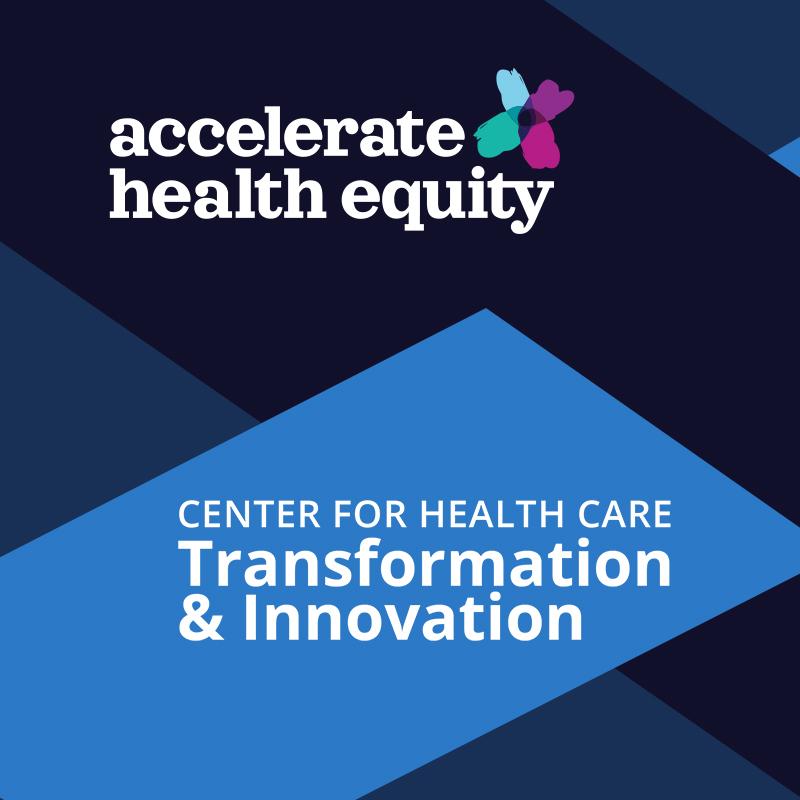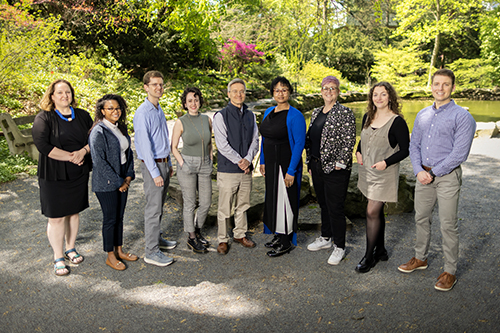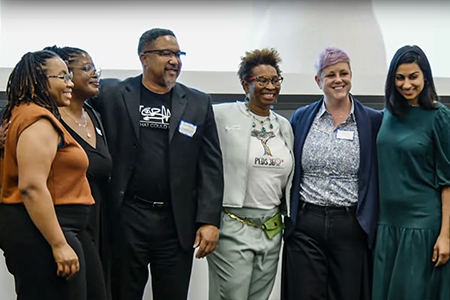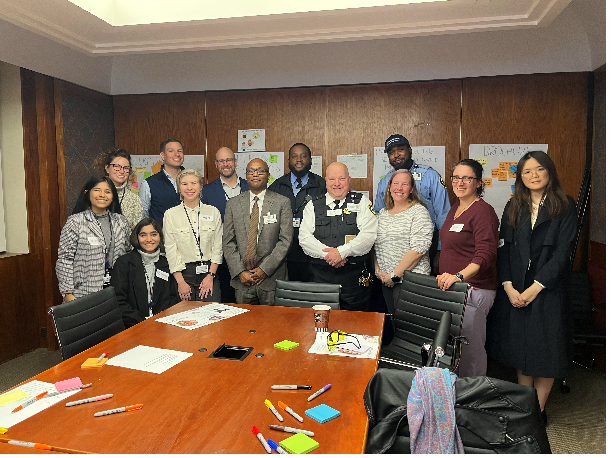Where equity and innovation meet: Five CHTI-supported programs advancing health equity with Philadelphia’s AHE

In early 2022, a group of Philadelphia-based health systems, payors, and community organizations formed Accelerate Health Equity (AHE), an initiative to advance health equity, address systemic racism, and improve health outcomes city-wide. In this roundup, we share how team members at the Center for Health Care Transformation and Innovation (CHTI) are propelling these efforts through research studies, clinical programs, and administration.

Staffing and leadership
Two CHTI members serve on the AHE Research and Administration Hub. Elissa Klinger, SM, the director of equity and innovation, advises on projects and operations and heavily supported the Well City Challenge in particular. Chalanda Evans, MPH, was the founding assistant director and led AHE’s small grants program. Additionally, CHTI executive director Raina Merchant, MD, MSHP, was a co-founder of AHE and a member of the original steering committee.
Linking Emergency Department Patients to Assistance Programs (LEAP)
Although federal and state benefits programs, which help with income, shelter, utilities, health care, food, and childcare, are available to qualifying Philadelphians, $450 million in benefits have gone unclaimed annually.
CHTI staff and partners AHE and Benefits Data Trust are now conducting a randomized controlled trial called LEAP to test whether text messages informed by behavioral economics are an effective way to connect patients – specifically, those who visit the emergency department (ED) – with public benefits.
“The ED is a valuable resource that provides timely care for people who are sick,” says Penn emergency physician Austin Kilaru, MD, MSHP, the primary investigator for LEAP. “In this study, we hope to add even more value to the essential medical care that is delivered there by using ED visits as an opportunity to engage patients regarding their long-term health, financial health, and social needs.”
To evaluate the intervention, researchers will examine whether participants contacted the public benefits enrollment program BenePhilly and filled out benefits applications. The study launched in November 2023 after a successful feasibility study and is expected to run about six months.
Along with Kilaru, CHTI team members driving the work include Aliza Haider, Lauren Southwick, MPH, and co-investigators Raina Merchant and Anish Agarwal, MD, MPH. Way to Health serves as LEAP’s automated text messaging platform, with implementation coordinated by Adriana Discher.

Well City Challenge
The Well City Challenge (WCC) is a social impact competition designed to generate and support ideas aimed at improving health and wellness in Philadelphia, particularly in Black and brown communities. WCC solicits proposals from local innovators and provides expertise and funding to foster their progression.
AHE began partnering with the Economy League of Philadelphia, which organizes the WCC, in 2023 for the competition’s second iteration. From 90 applications, 15 teams were selected to present at a pitch event in May; six advanced into an accelerator program. The grand prize was awarded in the fall to TCBMe, a platform that provides access to creative technologies and skill development to empower and enhance the wellness of disadvantaged youths.
Elissa Klinger provided leadership throughout the program, informing challenge design and engagement strategy, reviewing applications, and offering pitch support and mentorship to teams.
IGNITE Kids
Making broad and enduring progress in reducing the health disparities that Black Americans experience requires multi-faceted, systems-level intervention. That idea is the impetus for IGNITE, an NIH-funded study led by CHTI’s Eugenia South, MD, MS, in partnership with the Opportunity for Health Lab led by Atheendar Venktaramani, MD, PhD. IGNITE seeks to improve health equity in Philadelphia by deploying environmental and economic interventions at three levels: organizational, community, and household.
IGNITE Kids is an AHE-supported expansion of the program investigating how the interventions – which range from vacant lot greening and trash pickup to financial counseling and better access to public benefits – affect the health and well-being of school-age children in disadvantaged neighborhoods.
“We hypothesize that by improving the neighborhoods where children live and increasing the economic resources available to their families, we will be able to improve parent and child health and well-being, and ultimately promote more equitable health outcomes, for children in Philadelphia,” says Aditi Vasan, MD, MSHP, a pediatrician at Children’s Hospital of Philadelphia and co-principal investigator for IGNITE Kids.
Community coordinators Andre Reid, Ash Tryba, Craig Terry, Rikley Paixao, Helena Jeudin, Abeselom Gebreyesus, Sharon Nichols, Alex Sherman, Shay Peoples, and Jenelle Noell recruited over 600 participants across 58 neighborhoods for IGNITE and IGNITE Kids, including more than 200 participants with children. Study interventions are currently in progress, with results anticipated beginning in 2025. The project managers for both studies are CHTI team members – Evan Spencer for IGNITE and Hilena (Hilu) Addis for IGNITE Kids.

Gun violence prevention
There are tens of thousands of firearm-related deaths and many more nonfatal firearm-related injuries every year in the United States. Some of these injuries can be prevented by ensuring firearms are stored securely. With support from an AHE grant, the Nudge Unit is developing hospital-based programs to distribute and promote the use of gun locks to firearm owners, along with informational brochures with resources on safe storage.
The effort is led by Kit Delgado, MD, MS, and Elinore Kaufman, MD, MSHP, and supported by CHTI’s Laurel Adams, MBA, Arleen Lopez Cruz, Neda Khan, MHCI, Jane Maguire, MBA, and Athena Lee, MA. More than 200 locks and brochures have been distributed so far through pilots. The team recently conducted a co-design session with security supervisors and interviews with security guards at Penn Medicine hospitals, and the insights gathered will inform future iterations of the program.
Cycles of Impact
Cycles of Impact is an initiative to increase colorectal cancer (CRC) screening uptake in Black communities, with the goal of screening at least 5,000 individuals within three years. To promote participation, the program is running a variety of media campaigns and sending CRC screening navigators to health and community events in target geographic areas. Individuals whose initial fecal test comes back positive for CRC are assisted with scheduling a follow-up colonoscopy.
The program, which launched in 2022, is a collaboration among the Colorectal Cancer Alliance, Independence Blue Cross, AHE, and Penn Medicine.
From a research perspective, Cycles of Impact will help determine which awareness campaigns are most effective at boosting CRC screening completion rates, results that could help shape future health campaigns that aim to engage Black communities. CHTI’s Shivan Mehta, MD, MBA, MSHP, and Keyirah Williams are supporting the analysis component, evaluating interventions in terms of reach, screening completion, and other metrics.